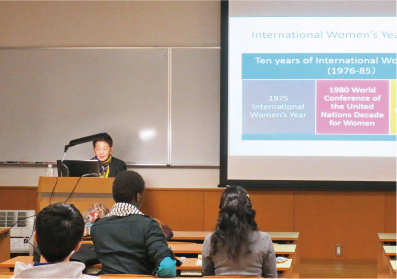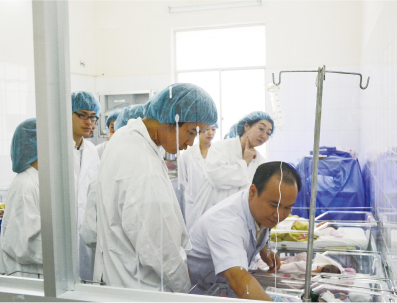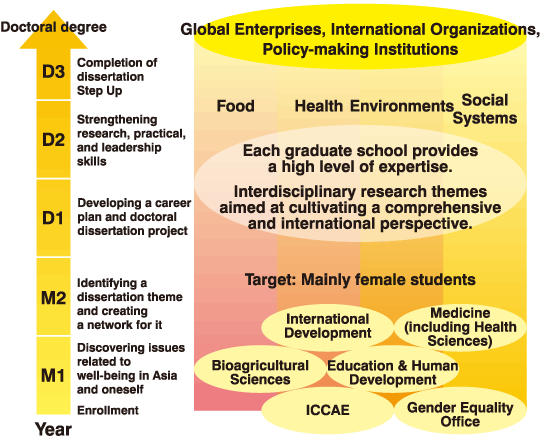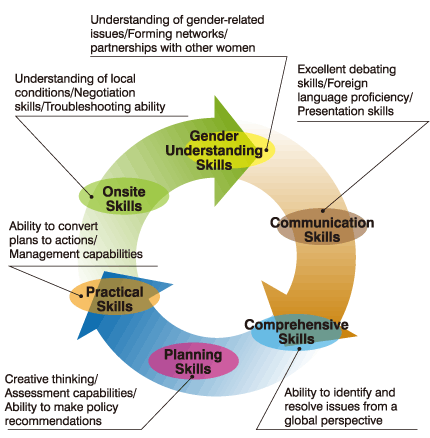
In order to solve the problems that global communities face, it is important to experience different cultures and cultivate a comprehensive and international perspective toward interdisciplinary research themes. Therefore, we have implemented a curriculum that includes lectures and seminars in English and practical education in cooperation with partner universities mainly in Asia and international organizations/international cooperation organizations. These include: the United Nations Children's Fund (UNICEF), United Nations Population Fund (UNFPA) and Japan International Cooperation Agency (JICA), and global enterprises. In addition to the elaborate instruction system provided jointly by four Graduate Schools, we conduct continuous support both during and after the program through the university’s well regarded mentoring system.

Lecture by Ms. Haniwa Natori, former Director-
General, Gender Equality Bureau, Cabinet Office
Comparing the present situation of women's
participation in Japan and abroad

Inspection of a hospital during overseas
fieldwork
Through overseas fieldwork conducted in Asia, students acquire knowledge and the ability to identify issues in a given region and discover why “well-being” is not achieved there. In addition, the students view, experience and feel firsthand to see what they can/must do to carry out their work. Students stay in Asian countries such as Vietnam, Indonesia, and the Philippines for a specified period of time, and carry out research along selected themes such as maternal and child healthcare, religion, and natural disasters. Students from different specialties and nationalities organize teams and work together. While focusing on high specialty, students acquire the capacity to identify and solve problems from a global perspective by developing an interdisciplinary mindset for the selected research theme.
At workshops for global leader development, we invite global leaders from organizations such as UNICEF, UNFPA, FAO, and JICA as lecturers, and they discuss various issues on “well-being.” They also highlight the skills needed to work actively in the international society and strategies for career development.
Furthermore, after the lecture, there are career counseling sessions. These workshops provide students with an opportunity to think about their future vision, career path and develop the skills to realize them under the direct instruction of the lecturers.
Website: https://www.well-being.leading.nagoya-u.ac.jp/eng/
[Composite Category-Pluralistic Society-] Selected for FY2013
[Application Eligibility]
Graduate School of International Development; Graduate School of Education and Human Development; Graduate School of Bioagricultural Sciences; Graduate School of Medicine (including Health Sciences)
[Partner Universities] 15 universities
University of the Philippines; Lund University; Royal University of Agriculture in Cambodia; Diponegoro University; Chulalongkorn University; Royal University of Phnom Penh; Gadjah Mada University; National University of Singapore; National University of Laos; University of the Philippines Los Banos; Vietnam National University, Hanoi; Indian Institute of Technology Bombay; University of Dhaka; University of Ottawa; United Nations University Institute of Advanced Studies
[Partner Institutions] 6 institutions
Ministry of Foreign Affairs of Japan; Japan International Cooperation Agency (JICA); United Nations Children's Fund (UNICEF); United Nations Population Fund (UNFPA); World Bank; Asian Development Bank (ADB)


















